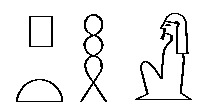Ptah, the Universal Architect God
The Memphis triad consisted of the universal
architect god, Ptah, patron of masons, his consort Sekhmet, the lion-headed one (sometimes
Bast the cat goddess), and Nefertum/Imhotep, their son, who was also a healer god.
Worshipped in Memphis from the earliest dynastic times (c.3100 BC), Ptah was seen as the
creator of the universe in the Memphite cosmology. He fashioned the bodies in which dwelt
the souls of men in the afterlife. Other versions of the myths state that he worked under
Thoth's orders, creating the heavens and the earth according to Thoth's specifications.
 Ptah
is depicted as a bearded man wearing a skullcap, shrouded much like a mummy, with his
hands emerging from the wrappings in front and holding the Uas (phoenix-headed) scepter,
an Ankh, and a Djed (sign of stability). He was often worshipped in conjunction with the
gods Seker and Osiris, and worshipped under the name Ptah-seker-ausar.
Ptah
is depicted as a bearded man wearing a skullcap, shrouded much like a mummy, with his
hands emerging from the wrappings in front and holding the Uas (phoenix-headed) scepter,
an Ankh, and a Djed (sign of stability). He was often worshipped in conjunction with the
gods Seker and Osiris, and worshipped under the name Ptah-seker-ausar.
Ptah was the god of Memphis, the ancient political capital of Egypt. In
fact, in the New Kingdom (1550-1070 BC) his temple there, Hewet-ka-Ptah (Mansion of the
spirit of Ptah), gave the name for the whole region and is ultimately the origin, via
Greek, of the word Egypt itself. In documents of the Ramesside era there are references to
Ptah as being responsible for fashioning gods and the sun and for the ripening of
vegetation.
But even earlier in the Old Kingdom, Ptah's nature as a supreme artisan
was fully developed and his High Priest at Memphis was called 'Greatest of the controllers
of craftsmen'. From the reign of Ramesses II (1290-1224 BC) we find that the god Ptah
joins with the deity Ta-tenen.
Ptah gave life to the other gods by means of his heart and his tongue.
Ptah's presence is universal in all gods, all people, all cattle, and all creeping things
that live. The essence of Ptah is his teeth and lips, so that by pronouncing the identity
of everything, the authority of his utterance was such that all creation came into being.  Whatever the
eyes see, the ears hear, and the nose breathes goes straight to the heart and the
conclusion reached by the heart is then spoken by the tongue. This is how Ptah commanded
all the gods into existence and how he became Ta-tenen, 'from whom all life emerged'.
Having managed the birth of the gods, Ptah created cities, sanctuaries, shrines and
perpetual offerings.
Whatever the
eyes see, the ears hear, and the nose breathes goes straight to the heart and the
conclusion reached by the heart is then spoken by the tongue. This is how Ptah commanded
all the gods into existence and how he became Ta-tenen, 'from whom all life emerged'.
Having managed the birth of the gods, Ptah created cities, sanctuaries, shrines and
perpetual offerings.
As the high god of Memphis, he was declared the master of destiny. It is
he who imparts to the phenomenal world the character of an established order, valid for
all time. In Abydos, in the temple of Seti I, he is called 'he who has created maat' -
that is, divine order.
Back to ermontown
ermontown
Last Modified on Wednesday, November 23, 2005
 Ptah
is depicted as a bearded man wearing a skullcap, shrouded much like a mummy, with his
hands emerging from the wrappings in front and holding the Uas (phoenix-headed) scepter,
an Ankh, and a Djed (sign of stability). He was often worshipped in conjunction with the
gods Seker and Osiris, and worshipped under the name Ptah-seker-ausar.
Ptah
is depicted as a bearded man wearing a skullcap, shrouded much like a mummy, with his
hands emerging from the wrappings in front and holding the Uas (phoenix-headed) scepter,
an Ankh, and a Djed (sign of stability). He was often worshipped in conjunction with the
gods Seker and Osiris, and worshipped under the name Ptah-seker-ausar. Whatever the
eyes see, the ears hear, and the nose breathes goes straight to the heart and the
conclusion reached by the heart is then spoken by the tongue. This is how Ptah commanded
all the gods into existence and how he became Ta-tenen, 'from whom all life emerged'.
Having managed the birth of the gods, Ptah created cities, sanctuaries, shrines and
perpetual offerings.
Whatever the
eyes see, the ears hear, and the nose breathes goes straight to the heart and the
conclusion reached by the heart is then spoken by the tongue. This is how Ptah commanded
all the gods into existence and how he became Ta-tenen, 'from whom all life emerged'.
Having managed the birth of the gods, Ptah created cities, sanctuaries, shrines and
perpetual offerings.